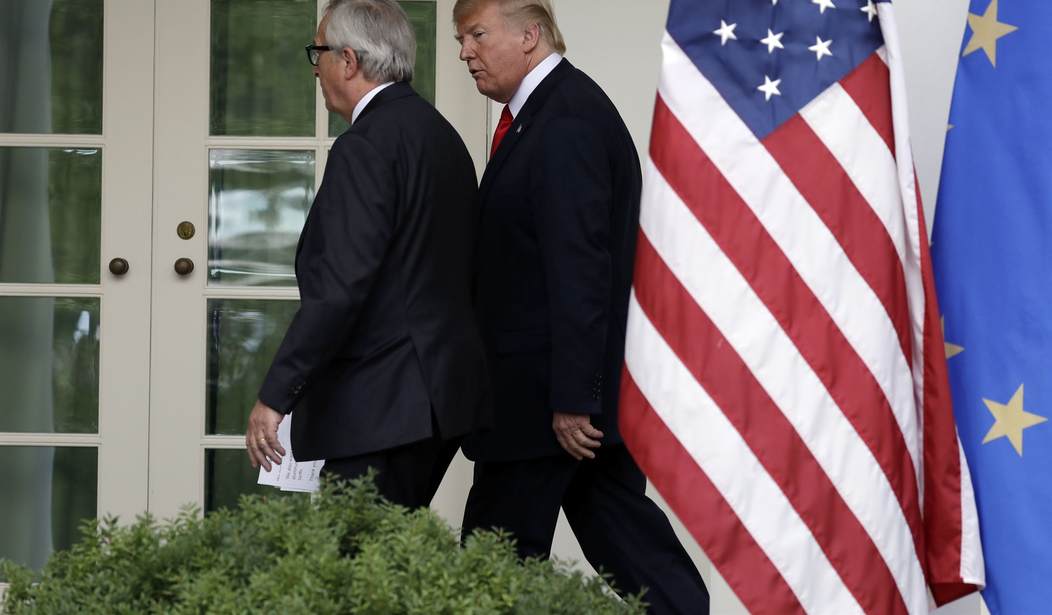WASHINGTON - It is said you can know the economic impact of the government’s policies by listening carefully to its critics, and that’s especially true with President Trump’s tariff taxes on trade.
The people and groups lining up in opposition to them include businesses, large and small, manufacturers, retail chains, farmers, trade associations, people who work in these sectors, whose jobs are in jeopardy, and a growing number of Republicans in Congress.
This has never been made clearer than in an editorial in the conservative Wall Street Journal, aptly titled “The Trade Casualties Mount.” It began this way:
“President Trump is escalating his trade rhetoric, threatening China and Europe with more tariffs on more goods if they don’t agree to his terms. Mr. Trump says winning these trade wars is ‘easy,’ so let’s take a look at the early returns on his steel and aluminum tariffs and the retaliation they’ve inspired.”
First and foremost is its political impact in swing states that will be critical in this fall’s midterm elections.
“Good luck to Republicans running on the Trump tariffs in November,” the Journal said in a separate op-ed. “The damage is likely to have political consequences, as the retaliatory tariffs [from our trading partners], targets states like Wisconsin, which Trump carried, that are dramatically impacted by his tariffs.
“Mr. Trump is also going to have some explaining to do to Wisconsin cranberry farmers, Florida orange-juice producers, and Iowa soy and corn growers,” the Journal’s op-ed said.
Recommended
Take, for example, Harley-Davidson’s decision to shift their production of made-in-the-USA motorcycles — which they export to Europe — to other countries to avoid paying the retaliatory tariffs slapped on them by the European Union.
Republicans will have to explain that one to the workers who will lose their jobs.
“Harley said ‘the tremendous cost increase, if passed on to its dealers and retail customers, would have an immediate and lasting detrimental impact to its business in the region, reducing customer access to Harley-Davidson products and negatively impacting the sustainability of its dealers’ businesses.’ Translation for Mr. Trump: Unlike real estate, cars and motorcycles are a global market,” said the Journal’s editorial board.
To make matters worse, Trump is threatening to slap a 20 percent tariff tax on all European cars imported into the U.S., and is stepping up his trade-breaking threats on two of our biggest trading partners, Canada and Mexico.
That could result in destroying the North American Free Trade Agreement, negotiated by President Reagan, that has been a major factor in America’s economic growth since the 1980s.
But Trump’s war on global trade doesn’t end there. He has slapped additional tariffs on China that will hurt U.S. retailers, large and small alike, with higher prices, hurting consumers in their pocket book, and likely causing layoffs as business revenues decline.
Since Commerce Secretary Wilbur Ross nailed a 10 percent tariff on aluminum and 25 percent on steel, saying it would help U.S. manufacturers, both industries have been hurt badly.
Alcoa, the nation’s largest aluminum manufacturer, has seen its stock fall 13 percent on Thursday of last week and another 3 percent the following day.
Alcoa says Trump’s tariffs have curtailed earnings, and could wipe out $100 million of this year’s income, the equivalent of about 18 percent of last year’s profits.
“Tariffs will not solve the challenges facing the aluminum industry,” says Alcoa CEO Roy Harvey.
Among other tariff “casualties,” the Journal points out that “many businesses are delaying investments in the U.S. because of the uncertainty caused by the tariffs.”
Oil pipeline manufacturer Borusan Mannesmann said the Department of Commerce had rejected its application for a steel-tariff exemption. “This has frozen its plans to invest $75 million in expanding production in Baytown, Tex,” the Journal reported.
Trump’s trade adviser Peter Navarro dismisses all of this as “no big deal.” But don’t tell that to the Farm Bureau who say the tariffs have hit U.S. agriculture really hard.
“Prices for all or our export-sensitive farm goods have tanked since May, when this tariff game started,” the Farm Bureau said last week.
Farmers are hurting under the administration’s trade war tariffs. So much so that it has announced up to $12 billion in emergency aid to farmers this week, as Trump pleaded with them to “be a little patient.”
“But if Mr. Trump escalates his protectionism, the pain will increase and so will the political backlash before November,” the Wall Street Journal warned.
The president must have taken their advice, because in a late breaking announcement Wednesday Trump and the European Union suddenly pulled back from his trade war in a bid to seek lower tariffs on both sides. Stay tuned.
























Join the conversation as a VIP Member